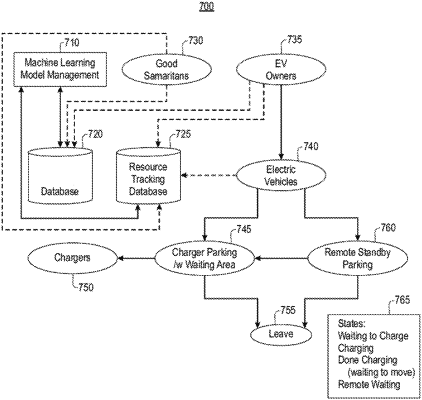| CPC B60L 53/62 (2019.02) [B60L 53/16 (2019.02); G06N 20/00 (2019.01); G08G 1/017 (2013.01); G08G 1/143 (2013.01); H02J 7/0047 (2013.01)] | 12 Claims |

|
1. A method for managing charging resources of a charging system for plug-in electric vehicles (PEVs), the charging system including a central recording center comprising a tracking database, the method comprising:
initiating a charging session to a first PEV based on detecting that the first PEV has been plugged into a charging station;
associating the first PEV with the charging session in the tracking database; associating, in the tracking database, the first PEV to a first user and a first PEV profile;
charging the first PEV in accordance with information from the first PEV profile comprising identifying data and technical information needed for activating and managing charging operations;
monitoring and storing charging session data in the tracking database during the charging session;
tracking users based on responsiveness after notification of an available charging station, and feedback on other PEV owners;
rewarding some users with early notification of charging station availability and optimal waiting location identification;
generating a machine learning model based on collective charging data, wherein the machine learning model comprises a plurality of trained regression models including a linear regression model, a polynomial regression model and a K-nearest neighbor (KNN) model; and
predicting charge completion time of the first PEV based on an average of outputs from the linear regression model, the polynomial regression model, and the K-nearest neighbor (KNN) model;
wherein the identifying data comprises license plate number and manufacturer vehicle identification number, and the technical information comprises PEV: manufacturer, model, year, and battery size.
|